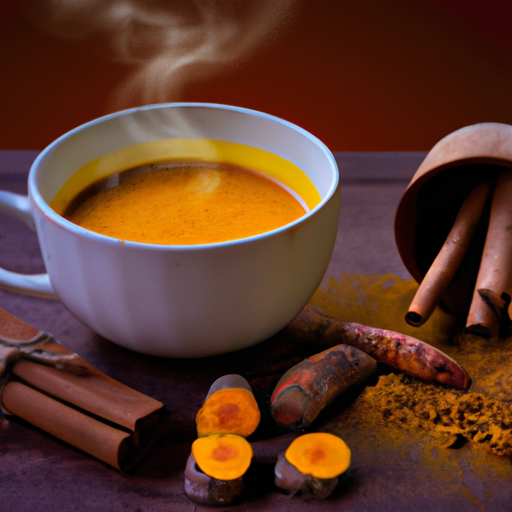I enjoy drinking a nice cup of turmeric tea. It’s not only tasty but also offers many health benefits. Curcumin is a key component in turmeric that contributes to its many advantages. However, curcumin is not readily absorbed by the body when consumed alone.
That’s where black pepper comes in – it contains piperine which helps to enhance the absorption of curcumin.
But how much black pepper should you include in your turmeric tea? This might seem like a small detail, but getting the right amount can make all the difference in terms of reaping the full benefits of this powerful drink.
In this article, I will explore why black pepper is important for turmeric tea and provide tips on how much to use for optimal results. So grab a mug and let’s get started!
Key Takeaways
- Black pepper is the most effective way to enhance curcumin absorption in turmeric tea.
- The recommended amount of black pepper to add depends on the amount of turmeric used.
- Ginger and healthy fats like coconut oil or ghee can also boost the effectiveness of turmeric tea.
- It is important to be mindful of dosage and potential side effects when consuming turmeric tea.
What is Turmeric Tea?
If you’re looking to add some warmth and a hint of earthiness to your daily beverage routine, turmeric tea is an excellent choice. Made from the roots of the Curcuma longa plant, turmeric has been used in traditional medicine for thousands of years due to its anti-inflammatory properties.
When brewed into a tea, turmeric can provide many health benefits. One of the main benefits of drinking turmeric tea is its ability to reduce inflammation in the body. This is due to the presence of curcumin, which is a powerful antioxidant that helps fight off free radicals that can cause damage to cells.
To brew the perfect cup of turmeric tea, start by bringing water and freshly grated or ground turmeric to a boil. Let it simmer for 10-15 minutes before adding any additional ingredients such as ginger or honey for added flavor.
And with that, let’s move onto discussing the role of curcumin in turmeric tea!
The Role of Curcumin in Turmeric Tea
I want to talk about the role of curcumin in turmeric tea.
Curcumin is a key compound found in turmeric that has been shown to have anti-inflammatory and antioxidant properties, which can help reduce inflammation and oxidative stress in the body.
Additionally, curcumin has also been found to boost the immune system, making it a great addition to your daily routine for overall health and wellness.
Anti-Inflammatory Properties
You’ll want to add a pinch of black pepper to your turmeric tea, as it can enhance the anti-inflammatory properties. For example, my friend who suffers from arthritis found that adding black pepper to their daily turmeric tea routine helped alleviate some of their joint pain. This is because black pepper contains piperine, which enhances the bioavailability of curcumin, the active ingredient in turmeric responsible for its anti-inflammatory effects.
To better understand how much pepper to include with your turmeric tea, refer to this table:
| Amount of Turmeric | Amount of Black Pepper |
|---|---|
| 1 teaspoon | 1/4 teaspoon |
| 1 tablespoon | 3/4 teaspoon |
| 2 tablespoons | 1 and 1/2 teaspoons |
It’s important to note that while turmeric tea benefits include reducing inflammation and improving overall health, it’s also important to be mindful of dosage and potential side effects. It’s recommended not to exceed more than one tablespoon per day without consulting with a healthcare professional. Additionally, those taking blood thinners or with gallbladder issues should exercise caution when consuming large quantities of turmeric or drinking turmeric tea. Moving forward, let’s explore how turmeric tea can also offer antioxidant properties.
Antioxidant Properties
Enhance the health benefits of your turmeric infusion by adding black pepper. This simple addition can increase the bioavailability of curcumin, the main active compound in turmeric, and improve its antioxidant effects.
Curcumin is known for its potent antioxidant properties that help fight oxidative stress and prevent cellular damage caused by free radicals. However, curcumin is poorly absorbed by the body on its own, which limits its effectiveness as an antioxidant.
Black pepper contains piperine, a compound that can enhance the absorption of curcumin by up to 2000%. When combined with black pepper, turmeric tea becomes a powerful antioxidant-rich drink that promotes overall health and wellbeing.
But the uses of turmeric go beyond antioxidants alone. There are many recipes for turmeric tea that incorporate other ingredients like ginger, lemon, honey or cinnamon to create delicious and healthy beverages that boost immunity, reduce inflammation and promote digestion.
Immune System Boost
To give your immune system a boost, adding black pepper to your turmeric infusion creates a powerful drink that can promote overall health and wellbeing. Turmeric has been widely recognized for its anti-inflammatory properties and ability to reduce oxidative stress in the body. These benefits make it an excellent natural remedy for combating illnesses such as colds and flu, which are often caused by inflammation and oxidative damage.
Black pepper not only adds flavor to your turmeric tea but also increases the bioavailability of curcumin, the active ingredient in turmeric. Curcumin is poorly absorbed by the body when consumed alone, but studies have shown that adding black pepper can increase absorption by up to 2,000%. This means that drinking turmeric tea with black pepper allows you to reap maximum benefits from its immune-boosting properties. Try out these delicious turmeric tea recipes with black pepper to give your immune system a natural boost!
The importance of black pepper cannot be overstated when it comes to maximizing the benefits of turmeric tea. The piperine present in black pepper enhances curcumin’s effectiveness by increasing its bioavailability in our bodies. In the next section, we will delve into more detail about how black pepper works synergistically with turmeric and why it’s essential for getting the most out of this powerful combination.
The Importance of Black Pepper
I want to talk about the importance of black pepper in turmeric tea. Specifically, I want to discuss piperine’s role in curcumin absorption, bioavailability, and digestive health.
Studies have shown that adding black pepper to turmeric can increase curcumin absorption by up to 2000%. This is because piperine, the active compound in black pepper, inhibits enzymes that break down curcumin in the gut and liver.
So, if you’re looking to maximize the benefits of turmeric tea, don’t forget to add a pinch of black pepper!
Piperine’s Role in Curcumin Absorption
Funny enough, adding just a pinch of black pepper to your turmeric tea can actually increase the absorption of curcumin in your body. This is because black pepper contains an active compound called piperine, which has been shown to enhance the bioavailability of curcumin by up to 2000%.
Piperine’s significance lies in its ability to inhibit certain enzymes in the liver and intestines that break down curcumin before it can be absorbed into the bloodstream. The health implications of piperine’s role in curcumin absorption are significant. Curcumin is well-known for its anti-inflammatory and antioxidant properties, but without proper absorption, these benefits may not be fully realized.
By incorporating black pepper into your turmeric tea or other dishes containing turmeric, you can ensure that your body is able to absorb more of this beneficial compound.
In the subsequent section about ‘bioavailability and digestive health’, we will explore other factors that can impact how much curcumin your body is able to absorb.
Bioavailability and Digestive Health
Boosting the bioavailability of curcumin is crucial for maximizing its health benefits, and understanding how digestive health plays a role in absorption is key. When it comes to turmeric tea, adding black pepper can aid in absorption due to the presence of piperine. However, there are other factors that affect bioavailability as well.
Here are some tips for improving the bioavailability of curcumin:
- Consume turmeric with healthy fats such as coconut oil or avocado
- Incorporate black pepper into your meals
- Optimize gut health by consuming probiotic-rich foods like kefir or kimchi
In addition to boosting absorption, drinking turmeric tea has many potential benefits such as reducing inflammation and promoting heart health. But when is the best time to drink it? It’s recommended that you consume turmeric tea between meals on an empty stomach for optimal digestion and absorption.
Now, let’s move onto another important question: how much black pepper should you use?
How Much Black Pepper Should You Use?
To maximize the benefits of turmeric tea, I recommend adding a small pinch of black pepper to your brew. Black pepper contains piperine, which has been shown to increase the absorption of curcumin – the active ingredient in turmeric that provides its anti-inflammatory and antioxidant effects.
By adding just a small amount of black pepper to your turmeric tea, you can increase the bioavailability of curcumin by up to 2000%. While black pepper is the most effective way to enhance curcumin absorption, there are alternatives if you don’t like its taste or want to switch things up.
Ginger is one option as it also contains compounds that improve digestion and nutrient absorption. Additionally, consuming turmeric with healthy fats such as coconut oil or ghee can also boost its effectiveness. Experiment with different combinations until you find what works best for you.
Now that we know how important black pepper is in maximizing the benefits of our turmeric tea, let’s move on to some tips for making a perfect cup!
Tips for Making the Perfect Cup of Turmeric Tea
If you’re looking to enhance the flavor and health benefits of your warm, comforting turmeric tea, try incorporating some of these tips into your routine. Not only will they help you brew a perfect cup every time, but they’ll also ensure that you’re getting the most out of this powerful spice.
-
Use fresh ingredients: Whether you’re using fresh turmeric root or ground powder, make sure it’s as fresh as possible for maximum potency and flavor.
-
Add black pepper: As we discussed in the previous subtopic, black pepper helps increase the bioavailability of curcumin in turmeric, making it more effective.
-
Steep for at least 10 minutes: To extract all the beneficial compounds from turmeric, let it steep for at least 10 minutes before drinking.
-
Experiment with flavors: Turmeric pairs well with a variety of other spices and herbs like ginger, cinnamon, and cardamom. Try adding different combinations to find your favorite blend.
By following these brewing techniques and experimenting with flavors, you can enjoy all the amazing benefits that turmeric tea has to offer.
Now let’s move on to some delicious recipes that incorporate this golden spice!
Turmeric Tea Recipes
I love experimenting with different turmeric tea recipes, and I’ve found some amazing variations that I’d like to share with you.
First, let’s start with the classic recipe that is a staple in my household.
Then, we’ll explore some fun additions and variations to switch things up.
Finally, for those who are vegan or dairy-free, I also have some delicious options that everyone can enjoy.
Let’s get started!
Classic Turmeric Tea Recipe
Nothing beats the warm and cozy feeling you get from sipping on a classic turmeric tea recipe. This traditional recipe is not only delicious, but it also comes with various health benefits.
Here’s how to make it:
- Boil 2 cups of water in a pot.
- Add 1 teaspoon of turmeric powder and stir well.
- Let it simmer for about 5 minutes.
- Add honey or lemon to taste.
- Strain the mixture into a cup and enjoy!
Turmeric tea has been used for centuries as a natural remedy for various ailments such as inflammation, arthritis, and digestive issues. The curcumin found in turmeric has antioxidant properties that can help protect against free radicals, reducing cell damage in the body. Drinking this classic recipe regularly can boost your immune system and improve overall wellbeing.
Now that you know how to make the classic turmeric tea recipe, let’s explore some variations and additions to spice up your taste buds even more!
Variations and Additions
Now that you know the classic recipe for turmeric tea, it’s time to explore some variations and additions. One of the easiest ways to switch up your turmeric tea is by adding different spices or herbs.
For example, you can add a pinch of black pepper, which has been shown to enhance the bioavailability of curcumin (the active compound in turmeric). Other popular spices to add include ginger, cinnamon, cardamom, and nutmeg.
Aside from spices, there are also several benefits-enhancing additives that you can incorporate into your turmeric tea. One option is to add a teaspoon of honey for its antibacterial properties and natural sweetness. Another option is coconut oil or ghee (clarified butter), which can help with the absorption of fat-soluble nutrients like curcumin.
Lastly, if you’re looking for an extra boost of antioxidants and flavor, try adding a slice of lemon or orange.
As we continue our exploration of turmeric tea recipes and variations, let’s now dive into vegan and dairy-free options.
Vegan and Dairy-Free Options
Looking for a plant-based alternative to traditional turmeric tea? Try incorporating vegan alternatives and dairy-free options into your recipe.
Instead of using regular milk, opt for non-dairy options such as almond, coconut, soy or oat milk. These alternatives are not only great for those who have lactose intolerance or follow a vegan diet but also provide additional health benefits.
Almond milk is high in vitamin E and healthy fats while coconut milk contains lauric acid which may help improve cholesterol levels. Soy milk is packed with protein and calcium while oat milk contains beta-glucans that are known to lower cholesterol levels.
Adding these dairy-free options can enhance the taste and nutritional value of your turmeric tea blend without compromising on flavour.
Transitioning into the subsequent section about ‘turmeric tea and weight loss’, it’s important to note that incorporating vegan and dairy-free options can be beneficial for individuals looking to lose weight.
Plant-based diets have been linked to numerous health benefits including weight loss, improved digestion, and reduced inflammation. By switching out dairy products for non-dairy alternatives, you can reduce your calorie intake while still enjoying the benefits of turmeric tea.
Turmeric Tea and Weight Loss
Turmeric tea, when combined with a healthy diet and regular exercise routine, can aid in weight loss due to its metabolism-boosting properties. This superfood has been used for centuries for medicinal purposes and is now gaining popularity as a weight loss supplement.
Here are three ways turmeric tea can help you shed those extra pounds:
-
Turmeric tea may boost your metabolism: Curcumin, the active compound in turmeric, has been shown to increase thermogenesis in the body. This can lead to an increase in metabolic rate, which is the process by which the body burns calories to produce heat.
-
Turmeric tea may help regulate blood sugar levels: High blood sugar levels can lead to insulin resistance and weight gain. Studies have shown that curcumin can improve insulin sensitivity and lower blood glucose levels.
-
Turmeric tea may reduce inflammation: Chronic inflammation is linked to obesity and other health problems. Curcumin has anti-inflammatory properties that can help reduce inflammation in the body.
In addition to aiding weight loss, turmeric tea also has stress-relieving properties. So not only will it benefit your waistline, but it’ll also help you feel more relaxed and calm throughout your day!
Turmeric Tea and Stress Relief
Feeling stressed and overwhelmed? Take a sip of this soothing drink that can help you relax and unwind after a long day. Turmeric tea has been shown to have stress-reducing properties, making it an excellent choice for those looking for natural stress management techniques.
The active ingredient in turmeric, curcumin, is known to reduce inflammation in the body, which can be helpful for those experiencing chronic stress. In addition to reducing inflammation, turmeric tea also promotes relaxation by increasing levels of serotonin and dopamine in the brain. These neurotransmitters are responsible for regulating mood and promoting feelings of happiness and well-being.
Incorporating turmeric tea into your daily routine may be an effective way to manage stress and promote overall mental health. Now let’s dive into how turmeric tea can benefit your skin health without missing a beat!
Turmeric Tea and Skin Health
You can improve the appearance of your skin by incorporating this delicious and soothing drink into your daily routine! Turmeric tea has numerous skin benefits when consumed regularly, but did you know that it also works wonders when applied topically?
Here are four ways turmeric tea can help enhance the health and beauty of your skin:
- Reduces inflammation: Turmeric contains curcumin, a powerful anti-inflammatory compound that can reduce redness and swelling on the skin.
- Fights acne: Studies have shown that applying turmeric paste to acne-prone areas can help reduce breakouts and prevent future ones from occurring.
- Brightens complexion: The antioxidants in turmeric can help improve overall skin tone and reduce pigmentation, resulting in a brighter, more even complexion.
- Hydrates dry skin: Turmeric’s natural oils and fatty acids make it an effective moisturizer for dry or flaky skin.
Incorporating turmeric tea into your skincare routine is easy – simply apply a small amount of cooled tea to clean, dry skin using a cotton ball or pad. Allow the tea to sit for 10-15 minutes before rinsing off with warm water. This simple step can make all the difference in achieving healthy, glowing skin!
Turmeric tea doesn’t just benefit your skin – it’s also great for overall wellness. By reducing inflammation throughout the body, relieving stress, and boosting immunity, this powerful spice can help you feel better both inside and out. So why not give it a try today?
Turmeric Tea and Overall Wellness
Now that we’ve talked about the benefits of turmeric for skin health, let’s dive into how incorporating turmeric tea into your daily routine can benefit overall wellness.
Turmeric has been shown to have anti-inflammatory and antioxidant properties, which can help reduce inflammation in the body and protect against damage from free radicals. This is important because chronic inflammation and oxidative stress are linked to a number of health issues, including heart disease, cancer, and autoimmune disorders.
One way to reap the benefits of turmeric supplementation is by drinking turmeric tea regularly. To make a simple turmeric tea, mix 1-2 teaspoons of ground turmeric with hot water or warm milk and add a sweetener like honey or maple syrup if desired. You can also experiment with adding other spices like ginger or cinnamon for flavor and additional health benefits.
By incorporating this easy habit into your daily routine, you may notice improvements in overall wellness over time.
Frequently Asked Questions
Can turmeric tea be consumed by pregnant women or individuals on medication?
As a pregnant woman or someone on medication, I was hesitant to try turmeric tea. But after researching its benefits, I found it can be safe in moderation. There are many recipes available online that incorporate this powerful spice.
Is it possible to consume too much turmeric tea?
Yes, consuming too much turmeric tea can lead to digestive issues and an increased risk of kidney stones. However, when consumed in moderation, turmeric tea benefits include reducing inflammation and improving brain function. Variations of the recipe may include ginger or cinnamon for added flavor.
Are there any side effects of drinking turmeric tea?
I’ve researched the potential side effects of drinking turmeric tea and found that high doses may cause gastrointestinal issues. It’s important to follow dosage recommendations and consider interactions with other supplements.
Can turmeric tea be made with other spices besides black pepper?
When I make turmeric tea, I enjoy adding ginger for some extra heat and a dash of cinnamon for sweetness. These spices not only enhance the flavor but also offer additional health benefits.
Can turmeric tea be consumed cold or only hot?
I have found that cold turmeric tea can be just as beneficial as hot. In fact, it’s perfect for summer! Experiment with different recipes like adding lemon or honey for a refreshing twist.
Conclusion
In conclusion, turmeric tea is a delicious and healthy drink that boasts numerous benefits for our bodies. By incorporating black pepper into your recipe, you can enhance the bioavailability of curcumin, the active ingredient in turmeric.
But how much black pepper should you use? The answer is simple: just a pinch! As little as 1/20th of a teaspoon of black pepper per serving can boost the absorption of curcumin by up to 2000%.
So next time you make yourself a cup of turmeric tea, don’t forget to add a touch of black pepper for maximum health benefits. Overall, drinking turmeric tea regularly can aid in weight loss, stress relief, skin health, and overall wellness.
So why not try making this golden elixir part of your daily routine? With its anti-inflammatory properties and potent antioxidants, turmeric tea is truly a powerhouse beverage that can help you feel your best.










